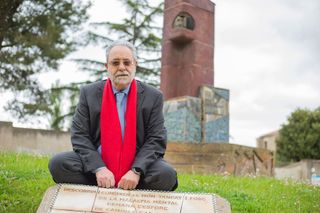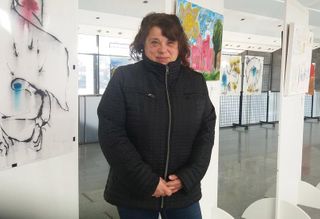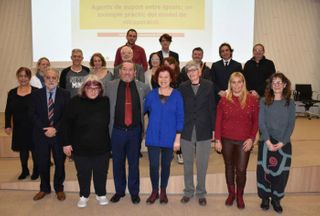Pere Bonet is a doctor specialising in Psychiatry, and the director of the Mental Health Chair created in 2019 by UVic-UCC and the Althaia Foundation and president of the Mental Health Cluster of Catalonia. He was Mental Health director of the Althaia Foundation, president of the Government of Catalonia’s Mental Health and Addictions Advisory Council, and is currently a Mental Health adviser to the Ministry of Health of the Government of Andorra, coordinating the country’s Comprehensive Mental Health Plan. He has worked with the WHO, and is a member of the Board of the European Association for Mental Health in Intellectual Disability (EAMHID). We talked to him about how the pandemic has impacted on the mental health of people and society, and how the chair he leads has changed and adapted to this situation.
More than a year after the start of the pandemic, can we now draw any firm conclusions about how Covid-19 has affected people's mental health?
It is still too early to have any overall knowledge including data on its impact, as the pandemic is not over yet. Persistent adverse circumstances affect individuals, social, educational and healthcare systems, and society at large. For example, we know that among people infected with Covid-19 it causes insomnia, anxiety, and for some of those people, cognitive impairment.
People have become more cautious in general terms, and the fact that this situation has lasted so long can contribute to anxiety becoming a depressive process. It all depends on each person's resilience, their ability to adapt, economic and above all, social factors. Maintaining relationships and the social network is fundamental, as they are protective factors. We need to make a distinction between people's emotional suffering and specific mental health disorders. Suffering need not necessarily develop into psychiatric disorders.
"People have become more cautious in general terms, and the fact that this situation has lasted so long can contribute to anxiety becoming a depressive process"
Can we now estimate what the emotional cost or footprint will be, personally and collectively, in the long run? Can those effects be reversed?
At the moment we can't estimate the costs, and it will take us some time to be able to do so. In fact, the most important repercussions of the financial and economic crisis of 2008 became apparent a couple of years later, in data such as the increase in suicides, poverty and the need for healthcare and measures to improve the economy and social welfare.
What we do know is that mental health care must become a standard practice in the education system without delay. What happens to children and young people if their personal interaction has been affected and limited for a long time? We have to boost the early detection of dysfunctional personal or family situations. The sooner we identify them, the less the likelihood that delicate situations become chronic.
Humans have a great ability to adapt. For this reason, the suffering can be reversed if the comprehensive protection measures in all areas are adequate. If we are able to maintain a cohesive society, in which people have a sense of control over their day-to-day lives, retaining a sense of identity and connection among its citizens, we will overcome this situation.

One of the groups that are most vulnerable to the pandemic, speaking in terms of mental health, is people who have had a previous disorder or illness. What impact has it had on them this year?
People with severe mental health disorders have continued to receive the care they need. There are examples of groups of people with psychotic disorders whose social participation has even increased, by means of virtual meetings and activities. The level of anxiety among people with anxiety and phobic disorders has risen, and they have needed more care.
And healthcare professionals? There has been a lot of talk about the emotional burden this pandemic has had for them, but do we have any idea of the impression it will leave on them in the long run?
The suffering in this group of professionals was most significant in the first stages of the pandemic. The system subsequently adapted, and teamwork increased. But we mustn't forget that the situation involved a lack of professionals, and that the pandemic has made that even more apparent. The ongoing nature of the situation has led the various institutions that provide health and social services to adopt detection and care measures for professionals, guides, rest measures, improved communication... In places which already had a mental health service, they helped other professionals. All this highlights the tension within the system.
"The suffering among healthcare professionals was most significant in the first stages of the pandemic. But the tension in the system is obvious"
What about children? Are they as able to change and as resilient as people say they are?
Childhood and adolescence are times of major developmental changes, and they have a more finely tuned ability to adapt. Another issue is how they have experienced it in their family and their environment, how they have been affected by the relationships between them, the ability to socialise and to establish the interpersonal relationships necessary to network and grow in the community.
What other groups can we think of as especially vulnerable in terms of mental health?
People who were experiencing isolation prior to the pandemic, elderly people without a social network, who are often invisible to the rest of society, as well as people in poverty before the pandemic. One of the main areas of the UN Sustainable Development Goals is the factor of poverty and people in a situation of social exclusion or at risk of falling into it.

How have mental health professionals addressed the challenge that arose a year ago? Can we say that the way we approach mental health has changed?
Mental health professionals have cared for their peers, and have started using communication systems that were not previously used as much as they could have been, such as the telephone and virtual communications. The latter format may be dependent on whether they have met the person face-to-face beforehand.
There is also a greater need for a relationship between primary healthcare and the network specialising in mental health to identify and provide for the best level of care, and a reinforcement of the partnerships between those levels.
"The pandemic has highlighted the greater need for a relationship between primary healthcare and the network specialising in mental health"
Could the way we deal with grief be affected when a loved one dies of Covid-19? How should we deal with it? And what support should professionals provide?
Care must be provided on a personal basis according to the cultural characteristics of the families affected. All cultures have rituals and liturgies for saying goodbye to relatives who have passed away. If that cannot happen in person, as has often been the case, the family must be accompanied in an act of farewell, and a ritual should be carried out to remember the person who is no longer with us. It is necessary to remember the dead, not to forget them, but maintaining the feeling of love and preventing the grief from persisting. In other words, to remember without emotional suffering.
The first mental health chair with a vision of a comprehensive system

The Mental Health Chair was created in 2019 as a result of the agreement between UVic-UCC and the Althaia Foundation, and has a very clear mission: to create knowledge for promotion, prevention and care, based on scientific evidence and international best practices in the field of mental health, in order to facilitate its implementation in society.
In the case of the Mental Health Chair, what benefits has the partnership between UVic-UCC and the Althaia Foundation brought?
The first benefit is coming together and creating synergies, because the Chair is the result of a common practice of care that is apparent in its governance, and in the fact that we have deputy directors from the world of psychology (Dr Gemma Prat) and the field of occupational therapy (Dr Salvador Simó), who provide an overall perspective of knowledge and care.
Second, in the two regions, Osona and Bages, there is a model of care that goes beyond purely psychiatric care. Both areas have created institutions – Osonament and MOSAIC – that complement therapeutic interventions and foster social inclusion.
Finally, being a mental health chair, the third in the world but the first with a vision of a comprehensive system, puts us at the forefront of carrying out teaching and knowledge transfer projects. In fact, we are already participating in institutions such as the Mental Health Cluster of Catalonia – the only one of its kind in the world, the Mental Health and Addictions Advisory Council of the Catalan Ministry of Health, and the TECSAM Network - Technological Innovation Network in Mental Health - among others. This is a young chair, which will develop further and which will bear fruit in the medium term.
Has the pandemic, which began a few months after the Chair was established, changed your perspectives for work?
Not at all. The goals and the horizon are the same. The "tempos" have been affected. For example, one of the first milestones that the Chair achieved was the signing with Yale University of a relationship with a leading institution in Recovery, the recovery and conferral of dignity for people experiencing mental health issues. This agreement has been followed by relationships with other institutions, and the pandemic has not stopped that.


"We focus on behaviour rather than illnesses, on what is observable and requires a holistic assessment of the individual person and their environment"
The Chair also contributes to the development of training programmes. With what aim in mind?
We have a postgraduate degree in Behavioural Disturbances and Mental Health in Intellectual Disability up and running; we are in the process of beginning a master's degree in Behavioural Disorders in Adolescence, and creating another master's degree in Innovation in Mental Health Care. The Chair focuses on behaviour rather than illnesses, on what is observable and requires a holistic assessment of the individual and their environment. This is always with a view to thinking in terms of a care system that is not only dedicated to individual and fragmented interventions, but which also incorporates education, work, housing, benefits and social care.
The Chair helps to define the standard of mental health. How does that happen, given the various ways of understanding reality?
Care for people must be provided individually, with comprehensive care and inclusion in the community. There are affected people, not diseases. Including affected people in their care process gives us access to each one's reality. In fact, among the many definitions of mental health, I prefer the one that emphasises the individual's ability to relate and cope with the various situations in which they find themselves. We all need to be able to be useful to the community, and not just professionally.
Projects in progress

THE PEER TO PEER PROGRAMME
The Peer to Peer programme, with financial support from "la Caixa" and in partnership with Osonament and Althaia, has made possible an initial training course for people with mental illness, which they can join to receive help from the care system. A second course is currently being prepared. The effect of learning and intervention has been assessed and evaluated by all the parties involved.

INTERACT
The InterAct Programme, led by Dr Salvador Simó, has produced an educational psychosocial support manual for students and professionals, in partnership with the Karolinska Institute, the HCi of Finland, the IB University of Applied Health and Social Sciences (Germany), the National University of Athens (Greece) under the auspices of the European Network for Occupational Therapy in Higher Education (ENOTHE).